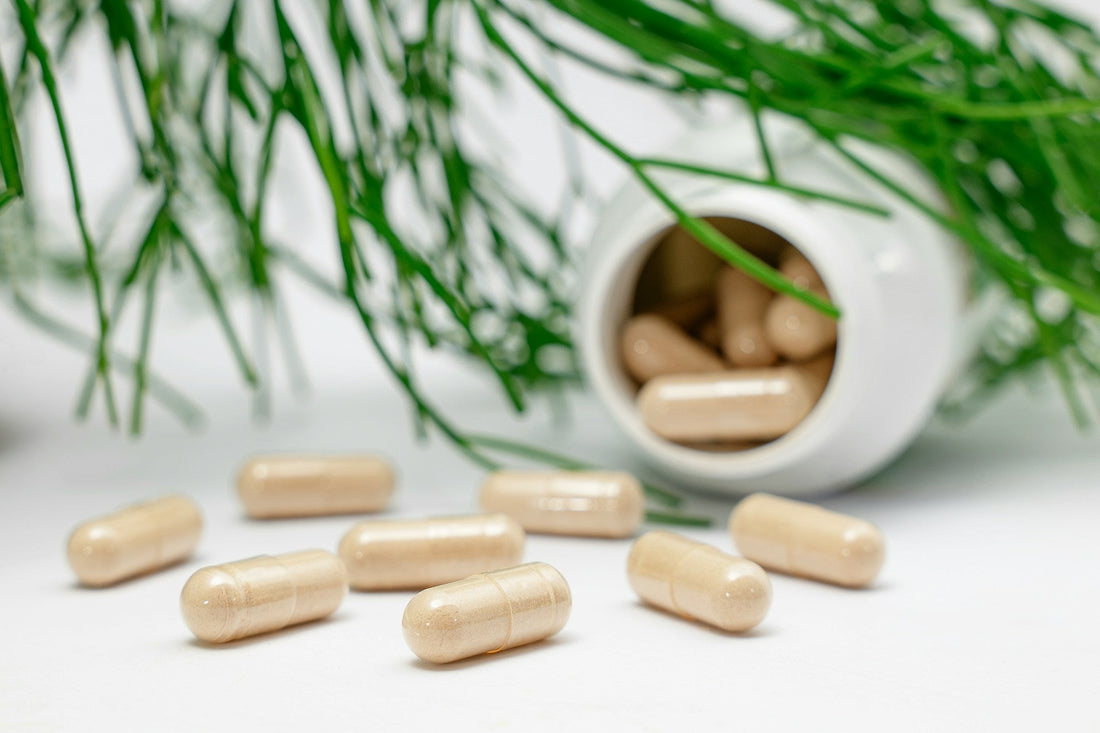
Oral Anti-Inflammatory for Hemorrhoids: Effective Relief Options and Benefits
Share
Hemorrhoids can be an uncomfortable and often painful condition, affecting many people at some point in their lives. While lifestyle modifications and dietary adjustments, like increasing your intake of dietary fiber, are essential for managing symptoms, oral anti-inflammatories can offer quick relief from pain and swelling.
When it comes to effective treatment options, choosing the right supplement matters. Hem Healer stands out as a top choice because it utilizes a 100% natural blend of botanical herbs specifically designed to alleviate the pain, swelling, and bleeding associated with hemorrhoids. This supplement is suitable for both men and women, providing a unique solution to a common problem.
Incorporating Hem Healer into your routine can significantly enhance your conservative treatment efforts, allowing you to manage hemorrhoids more effectively. By understanding the role of oral anti-inflammatories in your treatment plan, you can take proactive steps toward feeling better and improving your overall quality of life.
Understanding Hemorrhoids
Hemorrhoids are swollen veins in the rectal area that can cause discomfort and various symptoms. This section covers the classification, causes, risk factors, and diagnosis of hemorrhoids.
Classification and Symptoms
Hemorrhoids are classified into two main types: internal and external. Internal hemorrhoids occur inside the rectum and are generally painless but may cause bleeding during bowel movements. External hemorrhoids develop under the skin around the anus and can lead to swelling and pain, especially if a blood clot forms, resulting in a thrombosed hemorrhoid.
Basic symptoms of hemorrhoids include pain, itching, and discomfort in the anal region. You may also notice bright red blood on toilet paper or in the toilet bowl. If symptoms persist or worsen, seeking medical attention for proper diagnosis is crucial.
Causes and Risk Factors
The primary cause of hemorrhoids is increased pressure in the lower rectum, which may result from various factors. Chronic constipation and straining during bowel movements are significant contributors. You should also consider your dietary fiber intake, as a low-fiber diet can lead to constipation and worsen hemorrhoids.
Other risk factors include pregnancy, obesity, age, and prolonged sitting. Weakening of the tissue that supports the rectal veins can also be a factor. Recognizing these risk factors can help you manage your condition more effectively.
Diagnosis
Diagnosing hemorrhoids typically involves a physical examination of the anal area, possibly including a rectal examination. Healthcare providers may utilize instruments such as an anoscope or proctoscope to examine internal hemorrhoids more thoroughly. A colonoscope might be necessary if there are concerns about other gastrointestinal issues.
It's essential to differentiate hemorrhoids from other conditions that can cause similar symptoms. If you notice persistent bleeding or severe pain, consult a healthcare professional for an accurate diagnosis. For symptom management, you may consider natural supplements like Hem Healer, which offers a blend of botanical herbs designed to reduce the pain, swelling, and duration of hemorrhoids effectively.
Non-Surgical Treatment Options
Managing hemorrhoids non-surgically involves dietary and lifestyle adjustments, pharmacological treatments, and minimally invasive procedures. These options aim to alleviate discomfort and reduce symptoms effectively.
Dietary and Lifestyle Adjustments
A high-fiber diet is crucial for preventing constipation and straining during bowel movements. Incorporating fiber-rich foods, such as fruits, vegetables, and whole grains, can help soften stool. You may also consider fiber supplements if dietary sources are insufficient.
Along with diet, lifestyle changes play a role in managing hemorrhoids. Staying well-hydrated improves stool consistency. Regular exercise boosts circulation and digestive health, while avoiding prolonged sitting can reduce pressure on the rectal area.
Additionally, sitz baths can provide soothing relief. Soaking in warm water for 15-20 minutes may ease pain and swelling. Aim for multiple baths throughout the day for best results.
Pharmacological Treatments
Medications can help manage pain and inflammation associated with hemorrhoids. Over-the-counter nonsteroidal anti-inflammatory drugs (NSAIDs), such as ibuprofen, may relieve discomfort.
Topical treatments such as creams and ointments containing hydrocortisone or lidocaine can reduce itching and pain. These should be applied carefully to avoid further irritation.
For those seeking alternative relief, glyceryl trinitrate ointment can help relax anal sphincter muscles, improving blood flow to the area. Calcium dobesilate is another option that may improve venous health and reduce swelling.
Additionally, using stool softeners and laxatives can help prevent straining, facilitating smoother bowel movements. This conservative management can be an effective first step for many.
Minimally Invasive Procedures
If conservative treatment fails, minimally invasive procedures may be considered. Rubber band ligation is commonly used for internal hemorrhoids. It involves placing a band around the base of the hemorrhoid to restrict blood supply, causing it to shrink.
Sclerotherapy involves injecting a solution into the hemorrhoid, leading to its gradual reduction. This option is effective and typically performed in a doctor's office.
Infrared coagulation utilizes infrared light to coagulate hemorrhoidal tissue, causing it to shrink over time. Doppler-guided hemorrhoidal artery ligation is another advanced technique that identifies and ligates arteries supplying blood to the hemorrhoids, reducing their size.
For additional support in your recovery, consider Hem Healer. This 100% natural blend of botanical herbs taken orally can help reduce pain, swelling, bleeding, and severity of hemorrhoids for both men and women.
Surgical Interventions
Surgical interventions for hemorrhoids are often necessary for complicated or severe cases. These procedures aim to alleviate symptoms and promote healing, potentially offering a permanent solution.
Hemorrhoidectomy and Hemorrhoidopexy
Hemorrhoidectomy is a common surgical procedure where the hemorrhoids are excised. This method is particularly effective for grade III and IV hemorrhoids, which are often prolapsed and cause significant discomfort. Techniques include traditional excisional methods and newer options like the Ligasure hemorrhoidectomy, which minimizes bleeding.
Another surgical option is stapled hemorrhoidopexy. This method involves repositioning protruding hemorrhoids and is associated with less postoperative pain compared to traditional hemorrhoidectomy. While hemorrhoidopexy is less invasive, it may not be suitable for all patients, especially those with complicated hemorrhoids.
Regardless of the chosen technique, proper postoperative care is crucial to recovery.
Post-Surgical Care
Post-surgical care significantly influences recovery outcomes. You may experience some degree of postoperative pain, which can be managed with medications prescribed by your surgeon. Taking oral anti-inflammatory medication can help reduce both pain and swelling.
Follow-up appointments are important to monitor healing and address any complications. During this period, using a product like Hem Healer can support recovery. This 100% natural blend of botanical herbs can help reduce pain and promote faster healing.
Additionally, maintain a fiber-rich diet and stay hydrated to prevent constipation, which can exacerbate symptoms post-surgery. Regular gentle movement can also aid in recovery, ensuring you regain normal activity levels safely.
Managing Complications and Follow-up
Managing complications from hemorrhoids is essential for maintaining your health and comfort. Common issues include thrombosis, which can cause severe pain and swelling in the hemorrhoidal area.
Anal fissures may also occur due to excessive straining during bowel movements. These can lead to sharp pain and even bleeding. It's important to address these promptly to prevent further complications.
Anal stricture can develop as a result of chronic inflammation, which may restrict stool passage. Regular follow-up with your healthcare provider can help monitor any signs of stricture.
Incontinence could arise in advanced cases, where nerve damage occurs due to persistent pressure on the anal area. Consult your doctor if you experience any symptoms to manage this effectively.
While monitoring these complications, it’s crucial to be aware of colorectal cancer risk factors. Hemorrhoids can mimic symptoms of this serious condition; therefore, any unusual changes should be discussed with a healthcare professional.
Side effects from treatments, such as constipation or diarrhea, can also occur. Maintaining anal hygiene is vital; use gentle cleansing methods and avoid irritants.
For effective management, consider natural remedies like Hem Healer. This supplement is a 100% natural blend of botanical herbs designed for both men and women, helping to reduce pain, swelling, and bleeding associated with hemorrhoids. Regular use can enhance your recovery experience and promote overall well-being.

